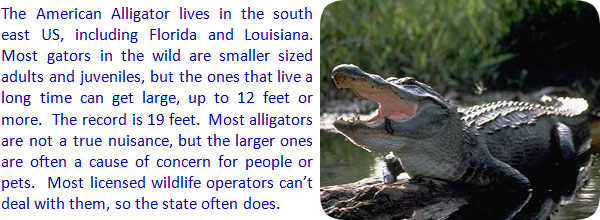- info@wildlifeanimalcontrol.com
Call us for help in your town
Wildlife Control Education
How to Catch an Alligator in the Lake, Pond, Yard, or Canal

Need alligator removal in your hometown? We service over 500 USA locations! Click here to hire us in your town and check prices - updated for year 2020.
Alligators are carnivores and can weigh up to 1,000 lbs. They are most frequently found in the Southeastern United States, most frequently in Florida and Louisiana. They live in freshwater rivers, lakes and marshes.
Alligators are large and frightening reptiles. They can injure or kill livestock, pets and sometimes go after humans. In order to catch one, you have to be alert and aware of your surroundings at all times.
No-kill Traps: The Trip Snare Trap
The most popular trap for catching alligators is the trip snare trap. The alligator goes after the bait, chicken is a popular one, and the guide boards force him to put his head in the correct spot. The wire is tripped and the snare, often with a locking wire loop, will hold him to the ground and keep him from ambling away.
Wire Cage Traps
There are also wire cage traps. You can buy them if you want to, or you can build your own. The cage should be about seven feet long, two feet tall and two feet wide to accommodate the alligator.
Put the trap in their habitat and partially submerge it in the water. Attach bait of some sort to the back. Herring works well, as does a whole chicken. When the alligator walks into the trap to eat the meat, the door will slam down and lock, making it impossible for him to get out.
Methods to catch that also kill
Catching an alligator alive to remove them from an undesirable area is the most humane way to get them out of your way. If you do not have that option, or feel that it will not be effective, there are a few ways to catch and kill an alligator.
Baited Fish Hooks
A baited hook is an effective way to catch and kill an alligator. A large hook, 12/0 or 14/0 sizes, is hung from a large pole or tree branch over their water source. Attach the bait to the hook. You can use a whole chicken, several large fish or beef lungs. The rope attached to the hook should be braided and have a 65 pound plus drag weight.
Tie the rope so the baited hook is about two feet above the water for large alligators. If they are smaller, shorten the distance a little bit. Set the hook and meat in the evening and leave it overnight. The alligators’ prime hunting time is after dark.
When the alligator jumps out of the water and takes the bait, the hook will become lodged in its stomach. This may or may not kill the alligator. If you check your hook in the morning and see that the alligator is still alive, a quick gunshot to the head will quickly kill them and put them out of their misery.
Shooting
Shooting alligators is an option for killing them. Use a gun with at least a .243 caliber bullet to make sure the kill is quick and humane. The main problem with this method is that, once shot and killed, the alligator will quickly sink to the bottom of the water it is in. It can be very difficult to retrieve the dead alligator, especially if you are trying to catch them in a river with a swift current or a body of very murky water.
Hand Cast Hooks
If you are catching an alligator in a body of water easily maneuvered by boat, you can use hand cast hooks. Attach the hooks to the same type of line used when baiting a hook dangling above the water and drag it behind the boat. Once you have caught an alligator, reel it up to the boat and quickly kill it.
Catching an alligator is best left to professional hunters and trappers. They have handled alligator removal many times and are less likely to become injured or even be killed by one. They also know the laws in your state pertaining to alligator capture.
If you choose to do it on your own, do not get close to the alligator, and call your local animal control office or game warden to come get the animal. Capturing alligators live is preferred to killing them. Use the kill methods as a last resort only.
More in-detail how-to alligator removal articles:
Information about alligator trapping - analysis and methods for how to trap.Information about how to kill a alligator - with poison or other methods.
Information about how to keep alligators away - prevention techniques.
Information about alligator repellent - analysis of types and effectiveness.
I know they aren't gators, but I wrote this article about How to Get Rid of Frogs.
This site is intended to provide information about how to catch a alligator in the Lake, Pond, Yard, or Canal, so that you can make an informed decision if you need to deal with a alligator problem. This site provides many alligator capture articles and strategies, if you wish to attempt to solve the problem yourself. If you are unable to do so, which is likely with many cases of alligator removal, please go to the home page and click the USA map, where I have wildlife removal experts listed in over 500 cites and towns, who can properly help you with your nuisance alligator. Click here to read more about how to get rid of alligators.

















